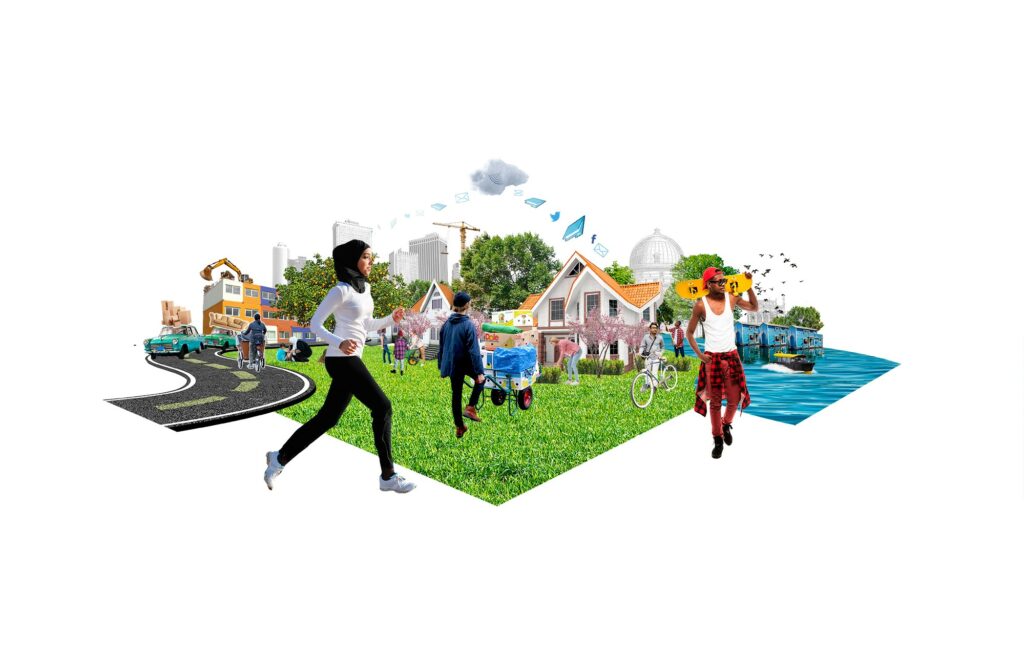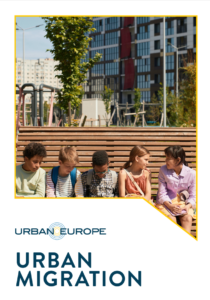
The Urban Migration call is finalized. Projects from the Urban Migration call had their final event on 2 February 2023. The results and outcomes of the projects are published on each projects page.
Aim of the call
The focus of this call is the ways that migration affects and is affected by the life and functioning of cities. As JPI Urban Europe aims for a broad scrutiny of urban migration, proposals submitted to this call should focus on one, many or a mix of migration types, categorized based on the following three principles (World Economic Forum, 2017):
> By political boundaries (internal vs. international migration)
> By movement patterns (step, circular or chain migration) or
> By taking a decision-making approach (voluntary vs. involuntary migration)
With this call, JPI Urban Europe aims to create a transdisciplinary and cross-sectoral community of researchers, practitioners and engaging migrant communities working in the field of urban migration, who can align, synthesise, consolidate, and learn from each other. Further, to develop common insights and understandings on the selected topics of the call as well as bring together already existing knowledge on migration across disciplines on national and local levels. The results from projects granted in this call should help to facilitate knowledge transfer and learning from different contexts, cities and countries to create greater engagement and understanding in migrant as well as host communities.
The call opened in December 2019 and in September 2020 8 projects were approved and started in January – March 2021. The final event took place in January 2023.
Participating countries: Austria, Germany, Latvia, Sweden and United Kingdom
Downloads
> Urban Migration Project Results Catalogue (2023)
Call topics
Topic 1: Socio-spatial integration and citizen involvement: Increased migration flow to urban areas can result in new opportunities as well as in challenges. One set of challenges in need of research and innovation concerns inequalities as well as socio-spatial and cultural segregation due to socio-demographic changes in communities and other local groupings. There is a need for new knowledge on measures and strategies that can promote social integration and increase citizen involvement and participation among populations. There is also a need for more knowledge based on comparisons between different spatial levels and types of cities.
Topic 2: Urban governance of housing issues: To be able to manage migration and assist the long-term integration of migrants, cities need to adapt solid housing practices and measures. Cities’ leeway in providing and assisting migrants has been dependent on the degree of state control vs. local and regional autonomy. Furthermore, factors of historical and cultural nature are important at the urban level. In relation to this, providing adequate and affordable housing to migrants is one of the biggest challenges, in terms of stresses on some cities’ settlement and housing capacities. Meanwhile, many urban areas experience an increased pressure on the housing market by other dynamics including the movement of citizens from rural to urban areas as well as demographic changes in the host populations.
Topic 3: Enhancing cities’ administrative capacities and supporting evidence-based integration policies (managing migration): Many initiatives, policies and actions have been undertaken to support integration processes in European urban areas, both to be able to handle emergency situations as well as long-term migration flows. However, difficulties exist in sharing information, results, knowledge and experiences of such initiatives to inform evidence-based urban policy making in Europe. Furthermore, there are insufficient tools for evidence-based integration and cross-country comparability of integration indicators in urban areas. Building an EU-wide knowledge base on integration measures and research results at city and regional levels can help to enhance policy learning and build an evidence base that can inform the translation of good practices into different urban contexts and support policy learning.
>> Learn more in the call text
Funded projects
Eight projects was selected in the Urban Migration call. The projects consist of transdisciplinary and cross-sectoral communities of researchers and practitioners. The projects will create projects that align, synthesise, or consolidate already existing knowledge on urban migration across disciplines on national and local levels. Participating countries in this call are Austria, Germany, Latvia, Sweden and United Kingdom.
>> Read about the results and outcomes of the projects on the project pages below.
The EMPOWER project: Empowering Cities of Migration: new methods for citizen involvement and socio-spatial integration
LoReMi: Local Responses to Precarious Migrants: Frames, Strategies and Evolving Practices in Europe
ProSHARE: Enhancing Diversity, Inclusion and Social Cohesion through Practices of Sharing in Housing and Public Space
MAPURBAN: Migrant Mobility and Access to Public Urban Resources
Inclusive Housing: Inclusive Housing policies: Housing is the beginning
MICOLL: Migration and housing: meeting refugees’ housing needs through collaborative housing programmes
HOUSE-IN: The Housing-Integration-Nexus: shaping exchange and innovation for migrants’ access to housing and social inclusion
The Art of Belonging: Social integration of young migrants in urban contexts through cultural place-making

See the projects presentation here.
> Search for projects in other calls
Timeline
Call opening 17 December 2019
Pre-proposal deadline 2 April 2020, 12:00 CET
Invitations to submit full proposal May 2020
Full proposal deadline: 4 September 2020
Funding decisions announced November 2020
Start of projects January 2021-March 2021
Projects end (the latest) January 2023
Documents
> Call text
> Call presentation
> List of National Contact Points
> Urban Migration projects presentation
Call secretariat
Austria
Johannes Bockstefl, FFG (also contact for questions related to the e-call submission system)
E-mail: johannes.bockstefl@ffg.at
Tel.: +43 (0)5 7755-5042
Funding Agencies and national contact points
>List of National Contact Points
| Country | Partner |
| Austria | FFG |
| Germany | DLR (on behalf of BMBF) |
| Latvia | IZM |
| Sweden | Formas |
| United Kingdom | AHRC |
| United Kingdom | ESRC |

